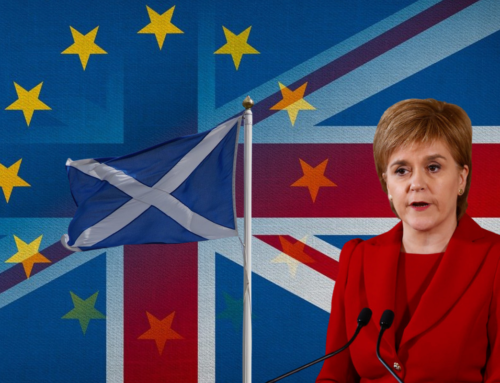By Brendan Donnelly, Director, The Federal Trust
25th September 2017
The limited concessions outlined in Theresa May’s Florence speech will probably have been enough to prevent the immediate breakdown of the Brexit talks, a breakdown which seemed at the beginning of the month a real possibility. They are, however, insufficient to reassure the EU 27 that enough progress has been made in the first tranche of negotiations (covering Ireland, citizens’ rights and the budget/exit bill) to move onto the issue of principal interest to the British government: future trade relations. The difficulties Mrs. May faced within her party in the days preceding (and, not least, following) her Florence speech illuminate how politically difficult, and probably impossible it will be for her to go significantly beyond the concessions she alluded to in Italy. The speech itself moreover continues to reflect a number of the crippling fantasies and misconceptions which make it difficult for this Conservative government to limit the economic damage arising from Brexit.It may well be that the Prime Minister’s publicity advisers had told her that a speech in Florence, delivered in front of a placard referring to “shared history, shared values and shared future,” would be sufficient to dispel the growing sense among our neighbours that the United Kingdom is retreating via its desire to leave the Union into snarling and self-indulgent insularity. The courteous and constructive tone of Mrs. May’s speech may have done something to allay these continental concerns. But the period before the speech and the physical circumstances of its delivery told a different story. The Commission, which is conducting the Brexit negotiations, did not send a representative and the phalanx of British ministers sitting in the front row at Santa Maria Novella made clear that Mrs. May’s speech was primarily an exercise in domestic party management. Politicians and officials in continental Europe had followed with appalled fascination the self-laceration of the Conservative Party in the days leading up to the Florence speech. Not a few of them will have wondered whether it will ever be possible rationally and realistically to negotiate with such a divided and unpredictable government. And their doubts have now deepened.
The past few weeks have clarified the division at the heart of the British Cabinet. There are those, led by Philip Hammond, the Chancellor, who wish, even in the longer term, to remain economically and politically close to the European Union. To this end they are prepared to envisage a relatively long transition period in which relatively modest changes to the relationship between the UK and the EU are phased in gradually; and they are prepared to accept a measure of dependence on the Union and its decision-making procedures, perhaps indefinitely. Those now led by foreign secretary Boris Johnson are suspicious of any transition period, however short, as postponing the day of liberation from the “shackles” of the EU. They emphatically reject any association with its decision-making procedures and would enthusiastically echo Mrs. May’s repetition in Florence that “no deal is better than a bad deal.” The difficulty she experiences in managing this Cabinet division stems from the fact that both factions have an apparently irrefutable argument on their side. Politically and constitutionally, it makes no sense formally to leave the EU and then attempt to mimic from outside the responsibilities of membership while enjoying fewer of its privileges. Boris Johnson for instance was emphatic after the Florence speech in welcoming the Prime Minister’s rejection of the “Norway option.” The traditional supporters of the Conservative Party in business and finance on the other hand are becoming increasingly alarmed by the prospect of an abrupt and chaotic British exit. They regard with ill-concealed contempt the claims of Liam Fox and others that the UK will replace whatever loss it suffers in European trade by rapidly enhanced trade with the rest of the world. Mrs. May finds herself torn between two pressing logics, the political and the economic. The EU’s deep structures are precisely designed to marry up economic and political integration. It is no surprise that leaving the EU creates this insoluble dilemma for the British government.
In Florence Mrs. May referred to her preferred solution for this dilemma, the “bespoke” arrangement supposedly governing trade between the UK and the EU after Brexit. It was in order to facilitate progress towards discussion of this “bespoke” solution that Mrs. May announced the possibility of British flexibility on outstanding budgetary questions and the rights of EU citizens in the UK. Predictably, she has been criticized by radical Eurosceptics within her Party for even these limited concessions. The form of the criticism has, however, been instructive, centring on the supposedly “premature” nature of the concessions. In her attempt to reconcile her Party’s warring factions, Mrs. May has to deal with the widespread misunderstanding in British public and political opinion of the balance of negotiating power between the UK and the EU. What she offered should not be seen as a possibly overgenerous opening bid from the British side that now needs to be met with an appropriate response from the European side. It was rather the absolute minimum to keep the talks in existence. A satisfactory settlement of the immediate problems caused for its partners by British EU withdrawal is a precondition for our European partners to move to the second phase of the negotiations. Further meaningful “concessions” from the British side, beyond those vaguely sketched out in Florence, will therefore be imperative even to proceed to the second phase of negotiations. The difficulty the Conservative Cabinet found in endorsing that limited flexibility shown in Florence does not bode well for the future.
Many commentators have pointed to the strangeness of Mrs. May’s continuing to insist that “no deal is better than a bad deal” when the central thrust of her Florence speech was precisely that the UK needs a transition period agreed with its European partners to avoid damaging economic disruption. Even more disconcerting, however, was the Prime Minister’s repetition of the misconception that the UK and its partners were or should be engaged in a joint enterprise: “making a success of Brexit.” Not merely do our European partners feel under no such obligation. They would regard as absurd any suggestion that they should. The UK has decided to leave because it wishes to abandon the joint decision-making which is central to the EU’s operation. It cannot expect that the Union will regard itself as the guardian of British interests after this abandonment. Commission President Juncker clearly explained this reality at the notorious dinner in Downing Street before the General Election, much to the distress of Mrs. May. The notion that the UK and the EU have equal and largely identical interests and responsibilities in the Brexit negotiations is of course central to Mrs. May’s aspiration to achieve a “bespoke relationship” with the EU. A “bespoke relationship” is her somewhat more elegant and less provocative version of “having our cake and eating it.”
It is illuminating that whenever possible models for this bespoke relationship are discussed in the UK they always turn out to have a more favourable balance of rights and responsibilities for the British side than existing trade arrangements. Although “CETA-plus” and “EEA-minus” have different arithmetic signs after them, they both point in the same direction, that of more benefit and fewer restrictions for the British side. Michel Barnier, speaking on the EU’s behalf, has been caustic in his rejection of this thinking, explaining on the day before the Prime Minister’s speech that the Union would not be prepared ever to agree an arrangement with the UK combining the considerable benefits of the EEA with the only limited restrictions of CETA (Comprehensive Economic and Trade Agreement). The repeated calls of David Davis and the Prime Minister for the EU to show “imagination and flexibility” in the Brexit negotiations are in the minds of our European partners troublingly flawed. It is for the UK to demonstrate imagination and flexibility, not for its 27 partners to negotiate on the British behalf; and these imaginative and flexible proposals need to be realistic, reflecting the fact that the UK needs the European economy, which is at least six times the size of its own, more than said European economy needs the UK.
Given all this, it is difficult to be optimistic for the prospects of a consensual Brexit after Mrs. May’s speech. It is extremely unlikely that her party will allow her to go beyond the clearly insufficient “concessions” at which she hinted in Florence. Even if they did, the second stage of the negotiations is almost certain to end in disappointment. There is no plausible “bespoke arrangement” that will reconcile the conflicting wings of the Conservative Cabinet in even the medium term. There are probably Cabinet members who realize this and for their contrasting reasons would welcome such a collapse of Mrs. May’s aspirations. Speaking earlier this year to a House of Commons committee, Mr. Davis compared aspects of the Brexit negotiations to a moon landing in their complexity. The comparison is apt. It must, however, be asked whether this divided and squabbling government can ever inspire confidence in its role as a latter-day NASA. At least Neil Armstrong knew on which celestial body he hoped to end up. David Davis does not even appear to know that.







